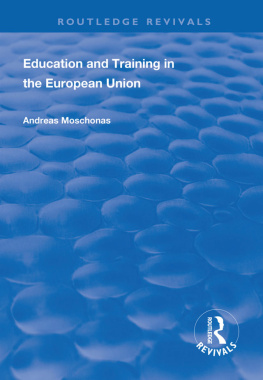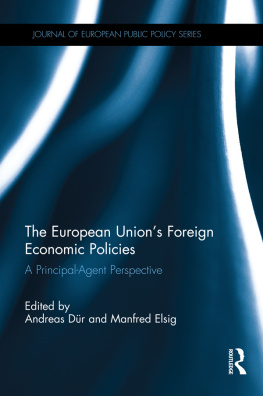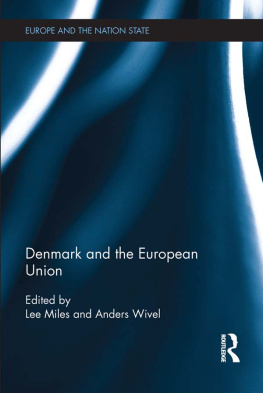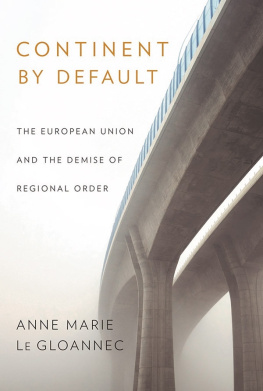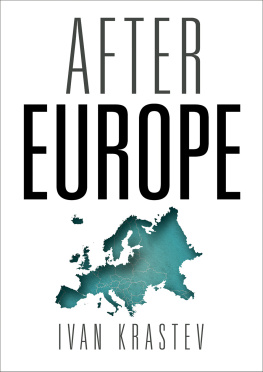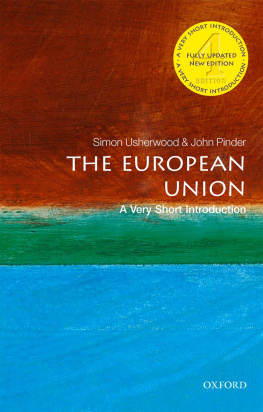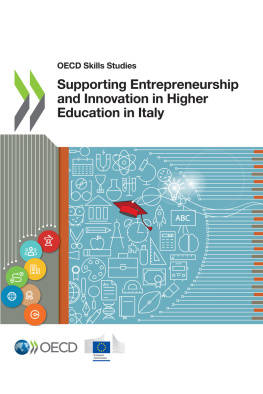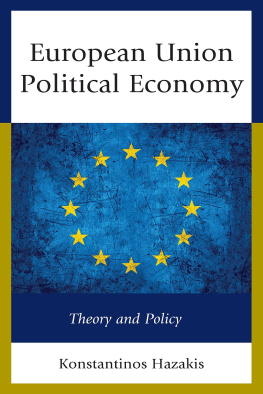EDUCATION AND TRAINING IN THE EUROPEAN UNION
Education and Training in the European Union
Andreas Moschonas
Assistant Professor Department of Sociology University of Crete
First published 1998 by Ashgate Publishing
Reissued 2018 by Routledge
2 Park Square, Milton Park, Abingdon, Oxon OX14 4RN
711 Third Avenue, New York, NY 10017, USA
Routledge is an imprint of the Taylor & Francis Group, an informa business
Copyright Andreas Moschonas 1998
All rights reserved. No part of this book may be reprinted or reproduced or utilised in any form or by any electronic, mechanical, or other means, now known or hereafter invented, including photocopying and recording, or in any information storage or retrieval system, without permission in writing from the publishers.
Notice:
Product or corporate names may be trademarks or registered trademarks, and are used only for identification and explanation without intent to infringe.
Publisher's Note
The publisher has gone to great lengths to ensure the quality of this reprint but points out that some imperfections in the original copies may be apparent.
Disclaimer
The publisher has made every effort to trace copyright holders and welcomes correspondence from those they have been unable to contact.
A Library of Congress record exists under LC control number: 97041409
ISBN 13: 978-1-138-31264-7 (hbk)
ISBN 13: 978-0-429-45809-5 (ebk)
The political sociology of European integration has for many years been the main subject of my teaching and research activities. I have mainly been interested in studying the logic of European integration, the building of supranational institutions and the formation of Community policies within a specific historical conjuncture, i.e. one ultimately defined by the prevailing relationship between social-class interests and political power at the sub-national, national and/or Community level.
The social dimension of European integration, aimed at the establishment of a 'social Europe' in a genuine political Community, has been a 'test case' in my EU studies, for it gives by itself a clear indication of the degree and the content of European integration. The study of institutions, processes and policies can become a fruitful exercise only if one tries through it to shed some light on the very classical question 'who gets, what, when, how and why'. Thus the function of redistributing wealth, in association with that of defining values, becomes a key criterion for determining the social content of political power.
The present work on education and vocational training in the Community has been pursued with these very thoughts in mind. It is a modest effort to examine why the EC decided to take action in the fields of education and training, what the extent of this involvement is, and how the future may affect EC decisions on education and training. The clue one gets from the present work is that we should watch more carefully how the relationship between economic integration and political unification unfolds in the years to come.
The bulk of this work was researched and written at the University of Reading, from October 1996 to June 1997, during my sabbatical leave from the University of Crete. I would like to thank Professor Christoph Bluth, Director of the Graduate School of European and International Studies, and Dr Stelios Stavridis, Director of the Centre for Euro-Mediterranean Studies, at the University of Reading, for their assistance during my work and for giving me the opportunity to work in a quiet and intellectually stimulating environment. I also thank Professor Keith Watson, Director of the Centre for International Studies in Education, Management and Training, at the University of Reading, for inviting me to present the conclusions of this work at a Departmental Seminar and thus giving me the opportunity to benefit from the discussion. The staff in the European Documentation Centre in the main Library at the University of Reading were very helpful to me and I am indeed grateful to them. A word of appreciation to Joan Batchelor who kindly read the whole manuscript and made useful comments on grammar and style.
I would also like to thank my colleagues in the Department of Sociology at the University of Crete, and especially Professor Yannis Pirgiotakis, Head of the Department at that time and currently Vice-Rector of the University, who allowed me to take a full-year leave of absence in order to concentrate on my research. Special thanks are due to Dionysis Gravaris who read the whole manuscript and made constructive comments.
Andreas Moschonas
Reading, June 1997
The social dimension of the European Union (EU) has been an integral part of European integration. It represents a natural complement to the completion of the internal market, due to the fact that the creation of a vast economic area, which is based on the market and business cooperation, requires the establishment of a European social area as well. In Delors's words, the "European social dimension is what allows competition to flourish between undertakings and individuals on a reasonable and fair basis", and thus any attempt "to give new depth to the Common Market which neglected this social dimension would be doomed to failure" (Delors, 1985 quoted in Hantrais, 1995: 6).
As such, the social dimension encompasses areas of social policy competence where initiatives are taken and uniform or at least minimum standards are set at the EU level. These include measures directly related to employment and working conditions, particularly the health, safety, and vocational training of workers as well as the mobility of young people within the Community. The EC education and training programmes were introduced to serve certain of these very objectives, that is, to enable young people to experience the 'reality of Europe' through various forms of cooperation, including training periods in firms in other member states, university courses in other Community countries, and exchanges. All these transnational mobility schemes are thought to represent a vital element of the Community's investment in human resources, by fostering improvement of the understanding of other European societies and cultures, encouraging cooperation between education and research institutions and the world of work, thereby helping to improve the quality of education, training and research, and also by paving the way for the creation of an employment and work area on a Community-wide scale [cf. COM(96)462 final].
In this broad context, the aim of this work is to examine a specific component of the European social dimension, namely the Community's initiatives and actions on education and vocational training. This raises the question: Why has the Community entered the field of education and training? It did so, a Community document states, in order to "encourage commitment to the Community's aims among the younger generations", and also to "promote mobility of human resources, which is a . This implies that the Community's actions on education and training have a dual objective, namely to contribute to (i) the completion of the internal market, and (ii) the formation of a Community cultural identity.
The completion of the internal market is associated with the full operation of the four basic economic freedoms which define economic integration. These are the free movement of goods, of capital, of services, and of persons. The latter embraces the free movement of labour as a precondition for the development of a European labour market. In this context education becomes a policy aiming at the improvement of the qualities of human capital, thereby contributing to the enhancement of both the productivity of labour and the competitiveness of the economy. I call this the social-economic dimension of education wherein the justification of any interest in educational rights is a consequence of the need to ensure the free movement of labour as an important component in factor mobility.


